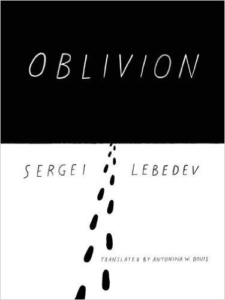Tr. by Antonina W. Bouis
Moscow-born author Sergei Lebedev’s Oblivion is an ambitious book. Its task is a vital one: to recover Russia’s collectively repressed memories of the prison labor camps under Stalin. Concerns are mounting that Putin’s Russia is actively undermining efforts to remember the horrors of Stalinism, even as its citizens clearly demand an unvarnished view of their nation’s history. Oblivion is one literary answer to this demand.
Despite the historical significance of such a project, it unfolds on an intimate scale as the unnamed narrator sets out to discover the truth about a man he grew up knowing almost nothing about, though they were an integral part of each other’s lives from before the narrator was born. Even the man’s name was a mystery: he was known only as Grandfather II.
A member of one of the Soviet’s upper-middle class dashas, the stoic, blind, elderly Grandfather II is treated as an elevated member of the community. There is something sinister, though, about Grandfather II from the start of Lebedev’s narrative, and one of Oblivion’s strong points is the pervasive eeriness that takes hold every time Grandfather II is mentioned. The young narrator’s intuitive understanding of the man challenges the surrounding adult insistence that Grandfather II is trustworthy and wise. But this sense of foreboding precedes the child’s own perception of Grandfather II, effecting the very circumstances of the narrator’s birth. During his mother’s pregnancy, an unprecedented family conflict erupted between those who thought the labor would be too dangerous, and those who believed she must have the baby. Grandfather II, after months of rendering himself practically forgotten in the dasha, spoke on the matter:
He said that she should definitely have the baby, medicine was advanced now — and that the doctors were being overly cautious. He listed births in trolley cars, the lamp room of a mine shaft, a cornfield, on a Central Asian steppe near the space center, in a bakery, a dentist’s chair, a bomb shelter. A more attentive listener would have recognized that Grandfather II was inventing these incidents, choosing such images from the life he knew or from newspapers, but he filled and overpopulated the room with these unexpectedly born infants . . . until the listeners’ focus dissolved . . . he begged her so persistently to have the baby, pleaded with her to fear nothing, that no one ever thought he was asking for himself.
The profoundly disturbing relationship that unfolds is one between a boy who, for good reason, cannot understand the authority that his family has given Grandfather II, and an old man with an abhorrent past. Grandfather II was a warden for the Russian gulags, and his son’s tragic death is revealed at the center of strange and horrifying events befitting a Russian folktale. His son had never been made aware of a world outside of the prison camp, and when the boy was seven, one of the prisoners gave him a bird-shaped whistle carved out of wood. Hearing a musical sound for the first time altered the boy so remarkably that he became obsessed with music, singing his own songs with a sense of possibility that, almost overnight, rendered him unfit to follow his father’s sometimes brutal and always regimented orders. Fed up with his son’s dreaminess, Grandfather II ordered the woodcarver executed, and attempted to bring his son back to him by demanding, from the prisoners, a different kind of elaborate woodwork: a minutely detailed miniature reconstruction of the camp, complete with smoking chimneys, moving trains that carried coal, and an orbiting sun. After days and nights of labor, this was achieved, and Grandfather II, manically proud of this toy camp, gifted it to his son, though there is strong implication that he wanted to keep it for himself. Lebedev writes movingly of what came after, effectively illustrating a traumatized moment of a boy who is harshly told that there is no world beyond this camp, that he was wrong. The hopeless boy destroys the miniature camp, and is severely punished by his father who, still convinced that he can re-mold his once-obedient son, never conceives that the boy could run away and commit suicide.
This sequence, as Lebedev writes it, takes place outside the narrator’s head and is rich enough in image and emotion to make up its own novella. Unfortunately, the vast majority of Oblivion takes place inside the narrator’s head, often undermining the power of his own imagery with prolonged meditations, poetic diatribes that seem to belie the author’s self-conscious effort to craft a literary work rather than simply tell this powerful story. The narrator’s meditations on the characters are effective, but the book itself gets bogged down when these become meditations on life in general. It feels, at points, like Oblivion is two different books: one is a gorgeous and graphic metaphor about contemporary Russia’s turning away from its history, the other is a series of Lebedev’s realizations about life, language, and memory, imbued with a sense of self-importance that distract from the objective importance of the history wants he us to understand. He’s successful in this endeavor when he more or less addresses is it directly:
The adults tried if not to forget . . . then to at least make it palatable for their own private memory. They broke it up into mild impressions, personal stories – what an ice hill there was by the ravine, now covered up; what nuts, all with rotten, wrinkled kernels, they bought at the market to make jam; what pale, water-diluted ink they used to pour into the inkwells at school, and then the teacher complained that they couldn’t read anything in their notebooks. That kind of past was like keys, wallet, and papers that you can stuff into your pockets when you go out; it was small, domesticated – someone diligently reinforced the little sport of personal memory, and no one remembered for the collective.
Here, Lebedev effectively illustrates the limits of personal stories: the same details that make an experience or a history more vivid can also serve as an escape. The narrator, here, is condemning the people of Russia for hiding behind the mundane details that made up their own lives and choosing to forget the larger injustices that made those memories possible. Frustrating, then, that when he does make an observation, his own voice takes over the novel, replacing any sense of larger importance with an inescapable sense of how this narrator, and only this narrator, perceives the immediate world around him. For the dozens of pages that he’s simply observing, the reader is less in Russia, and certainly less in objective history, then inside his particular head, becoming, whether we like it or not, deeply familiar with his particular thoughts. The greater mission of this book evaporates in what ultimately feels like Lebedev’s basking in his – and only his – own poetic expression. One example:
There is something indecent in soil unearthed by a shovel, in its friability, as if it were black farmer’s cheese, black buttermilk from a black cow; in its formlessness, readiness to fall apart — an in the cold wet grasp of chunks clinging to a boot. I once saw flooded tanks in the trenches, filled with impenetrable water, oily as overbrewed tea, which had absorbed rotting aspen leaves, year after year, until they dissolved . . . in the midst of the clear leafy forest filled with sunny glancing light, each trench was like a death cup filled with the earth’s juices.
Russian literature in particular, Dostoyevsky comes to mind, has long been adept at infusing its stories with philosophical meditation, but in this first novel it feels almost instructive, as though Lebedev has set out to show us what an author is supposed to do. Precisely because his observations are, at times, truly stirring — a guard dog whose bark had “nothing canine about it” — it’s almost a betrayal to feel suddenly stuck in one person’s meticulous observations throughout the novel, in exactly the kind of singular impressions that the narrator himself believes obfuscate the collective memory that is the urgent core of this book. Lebedev’s mission is important, here, at a time when Russian literature such as Varlam Shalamov’s daring Kolyma Tales, which directly confronted the Gulags after his own imprisonment, is no longer at the forefront of conversation. Oblivion seeks to expand on this fearless literary tradition, and is strongest when the narrator stops talking about what he sees and offers us the history of other people. As Lebedev’s first novel, it remains to be seen whether his narrow character lens will harden or broaden.
Sarah Neilson is a freelance editor in Boston. She writes a column for Full Stop on America’s emotional condition.
This post may contain affiliate links.








